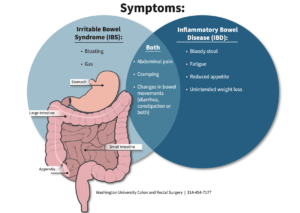Inflammatory Bowel Disease and Irritable Bowel Syndrome
IBD and IBS
IBD and IBS are two distinct conditions that affect the digestive system, but they have  different characteristics and underlying causes.
different characteristics and underlying causes.
Inflammatory Bowel Disease (IBD), includes conditions like Crohn’s disease and ulcerative colitis. On the other hand, Irritable Bowel Syndrome (IBS)
While both conditions can cause digestive symptoms and impact quality of life, the key distinction lies in the presence of inflammation and structural changes in IBD, whereas IBS is characterized by functional disturbances in the gut. It is important to consult with healthcare professionals to obtain an accurate diagnosis and appropriate management strategies for these conditions.
Inflammation and Structural Changes: In IBD, which includes Crohn’s disease and ulcerative colitis, there is chronic inflammation and structural damage to the gastrointestinal tract. In contrast, IBS is a functional disorder without inflammation or structural changes.
Diagnostic Tests: IBD can be diagnosed through various tests, such as endoscopy, colonoscopy, imaging studies, and blood tests, which can reveal signs of inflammation. In IBS, there are no specific diagnostic tests, and the diagnosis is typically based on symptom patterns and ruling out other conditions.
Severity and Progression: IBD is a more serious condition that can worsen over time and may lead to complications like strictures, fistulas, or colon cancer. IBS, although it can be debilitating, does not cause permanent damage or increase the risk of developing other bowel conditions.
Inflammatory Markers: People with IBD often have elevated inflammatory markers, such as C-reactive protein (CRP) or erythrocyte sedimentation rate (ESR), indicating ongoing inflammation. In IBS, these markers are typically within normal ranges.
Treatments: The treatment approaches for IBD and IBS differ. IBD is typically managed with medications to reduce inflammation, immune-modulating drugs, and, in some cases, surgery. IBS treatment focuses on symptom management through dietary modifications, stress reduction, lifestyle changes, and medications to relieve specific symptoms like diarrhea or constipation.
Prognosis: IBD is a chronic condition that requires long-term management, and its course can be unpredictable with periods of remission and flare-ups. IBS is also a chronic condition, but it tends to have a more benign course, with symptoms that can vary in intensity and frequency.
A naturopath like Leah can play a valuable role in supporting individuals with IBD or IBS by employing a holistic and personalised approach to care.
Naturopaths focus on identifying and addressing the root causes of digestive disturbances, considering factors such as diet, lifestyle, stress, and overall well-being. Leah will work closely with you to develop individualised treatment plans that may include dietary modifications, such as eliminating trigger foods, implementing an anti-inflammatory diet, or introducing gut-healing nutrients.
Additionally, Leah may recommend herbal remedies and nutritional supplements to support digestive function, reduce inflammation, and promote a healthy gut microbiome. She may also incorporate stress management techniques, such as mindfulness, meditation, and relaxation exercises, as stress can exacerbate symptoms. By combining her knowledge of natural therapies with evidence-based approaches, naturopath Leah aims to provide comprehensive support to individuals with IBD or IBS, helping them achieve symptom relief, improve their quality of life, and enhance overall gut health.
